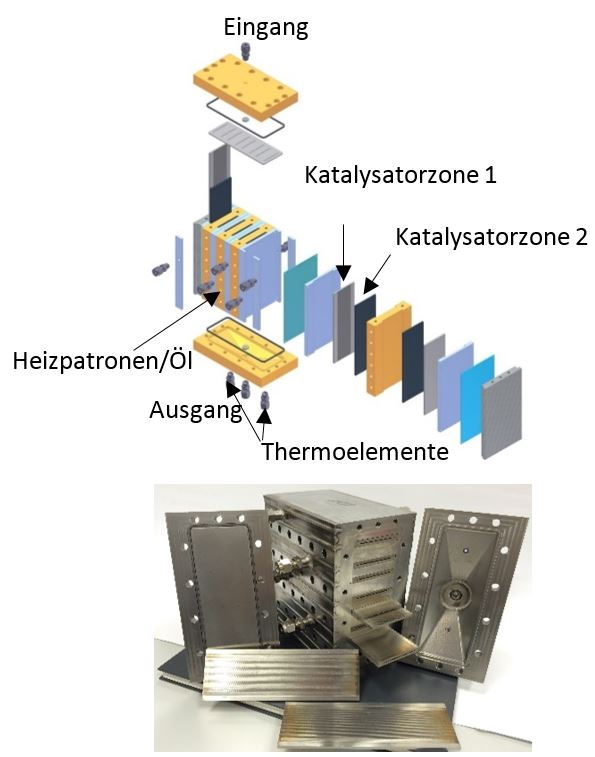Combination of Fischer-Tropsch synthesis and Hydrocracking
- contact:
- funding:
Peter und Luise Hager foundation
- startdate:
07/2015
- enddate:
07/2018
The so-called Power-to-Fuel technology (P-to-X) can contribute to the conversion of the transport sector from fossil fuels to CO2-neutral fuels. In addition to other alternatives such as e-mobility and hydrogen, liquid fuels will continue to play an important role in the transport sector, especially for heavy traffic and aviation.
Project abstract
Global warming is to be limited to a maximum of 2 °C by 2050 compared to the pre-industrial level. The transport sector accounts for almost 20% of anthropogenic greenhouse gas emissions.
P-to-X technology converts renewable energy and carbon dioxide into alternative liquid fuels. These are characterised by their high purity and high volumetric energy density. The drop-in quality makes it possible to use existing infrastructure. An attractive process route for the production of alternative liquid fuels runs through Fischer-Tropsch synthesis (FTS) and hydrocracking (HC). The CO2 can be activated in various ways: 1) water electrolysis and reverse water gas shift reaction (RWGS), 2) high-temperature co-electrolysis of water and carbon dioxide, and 3) direct synthesis of liquid fuels from hydrogen and carbon dioxide. Decentralized, small-scale plants with intensified processes, for example through micro-process technology, enable dynamic operation in order to meet the challenges posed by strongly fluctuating and locally available renewable energies.
The integration of cobalt-catalysed low-temperature Fischer-Tropsch synthesis and hydrocracking is the focus of this project. In a single-stage process, synthesis gas is mainly converted to liquid fuels (hydrocarbons in the chain length range of C10-C20) by selectively cracking the long-chain hydrocarbons from Fischer-Tropsch synthesis. A fixed-bed micro packed bed reactor or two different microstructured reactors with catalyst coatings can be installed in a test rig at the Institute of Micro Process Engineering in order to illustrate different variants of process integration. The influence of different process conditions (temperature, WHSV, pressure) on the productivity and selectivity of the process is investigated.
In the framework of the Helmholtz Program-oriented research (program Storage and Cross-Linked Infrastructures) systematic studies are performed on the different options for the integration of Co-based low-temperature Fischer-Tropsch-Synthesis and hydrocracking on the reactor level are carried out, involving both, experimental investigations and computational simulations. Supplementary to these investigations, the aim of the Peter and Luise Hager Stiftung project is to develop process integration patterns on catalyst level in order to derive an optimal configuration for Fischer-Tropsch Synthesis combined with hydrocracking. In the project it is also planned to extend the study towards integration of carbon dioxide activation into Fischer-Tropsch synthesis.
Design of the microstructured laboratory reactor to investigate a face-to-face arrangement of the FTS and HC catalyst layers of different temperature control.
Publications:
H.Kirsch, C. Sun, P. Pfeifer, R. Dittmeyer
Process Integration for Decentralized Power to Fuel Conversion Based on the Fischer-Tropsch Synthesis (Poster), European Summer School on Multiscale Modeling in Chemical Reaction Engineering, 18th-22th September 2017, Porto Carras, Greece
H.Kirsch, C. Sun, P. Pfeifer, R. Dittmeyer
Process Integration for Decentralized Power to Fuel Conversion Based on Fischer-Tropsch Synthesis (Poster), Annual Meeting of the ProcessNet Section Energy Process Engineering, 7th -8th March 2018, Frankfurt, Germany [accepted]
H.Kirsch, C. Sun, J. Schwab, P. Pfeifer, R. Dittmeyer
Process Integration for Decentralized Power to Fuel Conversion Based on the Fischer-Tropsch Synthesis (Poster), Annual Meeting on Reaction Engineering, 7th-9th May 2018, Würzburg, Germany [accepted]

